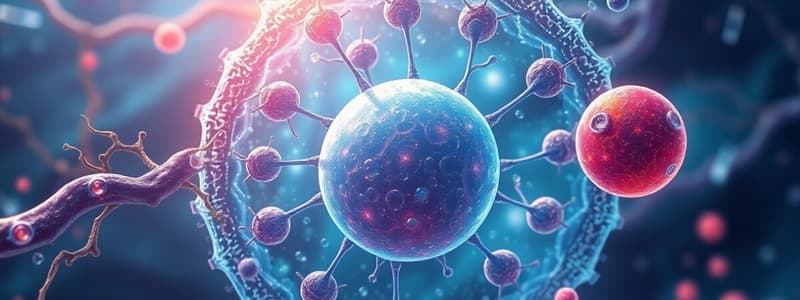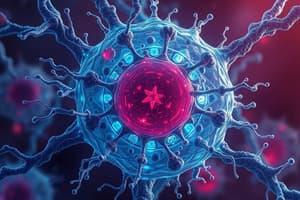Podcast
Questions and Answers
Homeostasis refers to the maintenance of nearly constant conditions in the external environment.
Homeostasis refers to the maintenance of nearly constant conditions in the external environment.
False (B)
A rise of 11°F (7°C) above normal body temperature can lead to cell destruction.
A rise of 11°F (7°C) above normal body temperature can lead to cell destruction.
True (A)
Electrolytes are organized into compartments that are important for maintaining homeostasis.
Electrolytes are organized into compartments that are important for maintaining homeostasis.
True (A)
Constant management of body pH is irrelevant to homeostasis.
Constant management of body pH is irrelevant to homeostasis.
Carbon dioxide levels in the internal environment are not homeostatically regulated.
Carbon dioxide levels in the internal environment are not homeostatically regulated.
Intracellular fluid (ICF) is found outside of cells.
Intracellular fluid (ICF) is found outside of cells.
Total body water (TBW) accounts for 50% to 70% of body weight.
Total body water (TBW) accounts for 50% to 70% of body weight.
Extracellular fluid (ECF) contains a higher concentration of potassium ions (K+) compared to intracellular fluid (ICF).
Extracellular fluid (ECF) contains a higher concentration of potassium ions (K+) compared to intracellular fluid (ICF).
Osmolarity and tonicity are important principles in understanding body fluids in specific conditions.
Osmolarity and tonicity are important principles in understanding body fluids in specific conditions.
Extracellular fluid (ECF) primarily consists of plasma and interstitial fluid.
Extracellular fluid (ECF) primarily consists of plasma and interstitial fluid.
Flashcards are hidden until you start studying
Study Notes
Homeostasis
- The human body is composed of trillions of cells that perform specialized functions to maintain the body's function and structure.
- Homeostasis is the dynamic state of equilibrium, the maintenance of nearly constant conditions in the internal environment.
- Homeostasis is essential for the survival of each cell.
- The internal environment refers to the extracellular fluid (ECF), which surrounds the cells.
- The ECF contains essential nutrients, minerals, and gases needed for cell survival.
- The ECF also carries waste products away from cells.
- The body employs homeostatic control systems to maintain a relatively constant internal environment.
- These systems are responsible for detecting changes in the internal environment and initiating appropriate responses to restore equilibrium.
- Homeostasis is achieved through a delicate balance of various physiological processes.
- Deviations from the normal range of a given factor can indicate an illness.
- Maintaining a stable body temperature is crucial, even a small increase in temperature can trigger a cycle of increased cellular metabolism leading to cell destruction.
Body Fluid Compartments
- The total body water (TBW) makes up 50% to 70% of body weight.
- TBW is divided into two main compartments: the intracellular fluid (ICF) and extracellular fluid (ECF).
- The ICF is the fluid inside cells, while the ECF is the fluid outside cells.
- The ECF is further divided into plasma (the fluid portion of blood) and interstitial fluid, which surrounds cells.
- The ECF is rich in sodium, chloride, and bicarbonate ions, while the ICF is rich in potassium, magnesium, and phosphate ions.
Osmolarity and Tonicity
- Osmolarity is a measure of the solute concentration per unit volume of solvent.
- Tonicity refers to the osmotic pressure gradient between two solutions separated by a semipermeable membrane.
- Osmolarity and tonicity are crucial for maintaining fluid balance and cell function.
Principles of Body Fluid Measurement
- Measuring body fluids is essential for understanding and monitoring fluid balance.
- Various techniques are used to measure body fluid compartments, including isotope dilution and bioimpedance analysis.
Studying That Suits You
Use AI to generate personalized quizzes and flashcards to suit your learning preferences.




